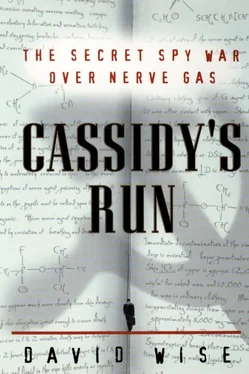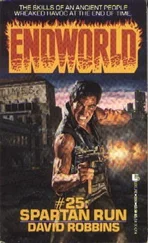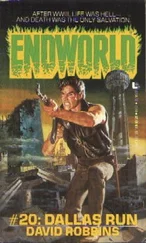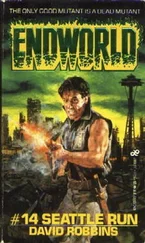Occasionally, Cassidy asked a question, but “Mike” seldom answered. “When I would ask questions he would answer with a question.”
Russians like to drink, and Cassidy felt he had to keep up. “Polikarpov was drinking vodka on the rocks. I was drinking bourbon and ginger ale. Some nights we would not break up until around two A.M. Although I watched my drinking, I felt I had to play the game.
“Sometimes with a glow on, he would have me drop him off in locations in Washington that I was not familiar with, like Walter Reed Army Medical Center. I would have a job trying to find the Fourteenth Street bridge. I would get home, grab a few hours sleep, then go off to work.”
Polikarpov, like a skilled spy, was proceeding slowly. He knew it was important to cultivate a source gradually. But after several dinners, it was time for the first move.
“One night we were eating, and he said, ‘Joe, can you do me a favor?’ I said, ‘If I can.’”
Polikarpov took the plunge. “We’re interested in some nuclear power information,” he said.
“I don’t know what country you’re from,” Cassidy replied, “but I’m loyal to my country. I would never do anything to hurt my country.”
“No, this is peaceful,” Polikarpov protested. “We in Russia have some—”
“Oh, you’re from Russia?”
Polikarpov nodded. “We have some desolate areas,” he continued, “where we would like to get power. I’ll pay you for the information.” Polikarpov paused. “Joe, I don’t want you to do anything improper.” But it was terrible, the Russian went on, that there were people in his country who had no electricity. All he was asking Cassidy to do was to help him help his people obtain basic necessities. [4] Polikarpov, in this first request, asked for information about nuclear power, a much less sensitive topic than, for example, nuclear weapons. Often, an officer of the GRU or the KGB made an initial request for something even more innocuous—perhaps an unclassified telephone book or manual. If the potential recruit provided it, the officer would ratchet up a notch and ask for a more important document. From there, the officer might ask for secret information and offer to pay for it. Polikarpov was more or less following the traditional script.
Cassidy waited a long moment, as though he were turning the matter over in his mind. “OK,” he finally replied. “Since I consider you my friend, I will try to help you, within limits. As long as it’s peaceful, I’ll see what I can do.”
“Mike” then asked Cassidy to meet him with the documents a few days later at 10 A.M. on a residential street just off Route 1, half a mile north of the sprawling Belvoir military complex.
“Don’t wear your uniform,” the Russian said.
“I have to,” Cassidy replied, “I’m working.”
Then wear an overcoat, Polikarpov instructed him. Cassidy said he would but pointed out that the coat would be olive drab and would still bear his sergeant’s stripes.
Before the scheduled meeting with Polikarpov, Cassidy joined two of his FBI handlers at the chicken restaurant on Route 1. The agents handed him documents that had been cleared to be given to the GRU officer.
At the rendezvous with the Russian, Cassidy produced the material. “I have to have it back,” he warned.
“No problem,” Polikarpov said, “I’ll have it back this afternoon.” Around 3 P.M., they met again, and Polikarpov, having had time to photograph the documents, gave them back to the sergeant.
Later, Cassidy met the FBI men again at the restaurant, returned the documents to them, and was debriefed. The same procedure was followed in a subsequent series of meetings. Polikarpov pressed for any and all information Cassidy could get on nuclear power. In each case, Polikarpov took the documents from Cassidy in the morning and, like clockwork, returned them in the afternoon so that Cassidy could supposedly slip them back into the army’s files.
No money changed hands at the first rendezvous, but Polikarpov paid Cassidy for the documents he brought to their later meetings. Cassidy turned the money over to the FBI agents. [5] Under government rules, the FBI was allowed to use the Soviet money it received in this manner to pay the actual costs of the double-agent operation. Any amount over that had to be turned over to the Treasury. One of the ironies of the espionage activities of the cold war is that the Russians actually ended up paying part of the cost of their own deception in SHOCKER. The money flowed both ways, of course; during those years, hundreds of thousands of dollars were paid by the CIA and other U.S. intelligence agencies to sources who were actually working for the KGB or the GRU, or equally for both sides.
In March 1960, Polikarpov handed Cassidy off to a second “Mike,” who took over the meetings. Polikarpov and Cassidy continued to play volleyball at the Y on Thursday evenings. The FBI identified WALLFLOWER’s new control as Gennady Dimitrievich Fursa, another GRU officer, who was listed simply as an “attaché” in the political section of the Soviet embassy. But Fursa missed two meetings, and the FBI had Cassidy express his concern to Polikarpov at one of their volleyball games.
Although Cassidy continued to pass documents to the Russians under the FBI’s guidance, he was distracted in 1960 by personal problems. “My marriage was souring,” he said. One of his army buddies, also a noncommissioned officer, was put on orders for Korea. “It gave me an idea: Why not me, too? This may be the way to save the marriage. My marriage vow was very important to me. I felt I had to try to make it work. Maybe if we were separated for a while things might be different. Maybe a year away from home might patch things up.”
WALLFLOWER’s plan to leave the United States for an overseas post dismayed the FBI, but the bureau had little choice but to go along with Cassidy’s wishes. The human factor was central to the success of any espionage operation; it could not be ignored. Cassidy clearly wanted to get away from Washington for a time. The army and FBI approved his transfer to Korea.
Before he left in September 1960, the Russians gave him recontact instructions for his return. That was welcome news to the FBI, since it meant the operation might not be over after all.
“I was told to take a red crayon and crush it on the sidewalk in front of a photography store in Washington,” Cassidy recalled. “And the next day I was to walk with a pipe in my mouth and a book in my hand on a residential street in Maryland, and someone would come up to me with a code phrase. The contact would ask, was a certain movie house nearby? Cassidy was to give a prearranged reply.
WALLFLOWER memorized his instructions. He would see, when he came back from Korea, whether his wife, or the Russians, were waiting for him.
When Joe Cassidybegan his dealings with the Russians in the late summer of 1959, it was still the era of tailfins and jukeboxes, the last decade of a Main Street and Norman Rockwell America. Microchips, MTV, and the Internet were light-years away.
It was the height of the cold war. A little more than a decade earlier, on March 5, 1946, Winston Churchill had delivered his famous speech at Westminster College in Fulton, Missouri. “From Stettin in the Baltic to Trieste in the Adriatic, an iron curtain has descended across the continent,” he warned. “Behind that line lie all the capitals of the ancient states of Central and Eastern Europe.”
At home, the 1950s had seen the rise and fall of Senator Joseph R. McCarthy of Wisconsin. Although he ultimately self-destructed, the legacy of suspicion he sowed by exploiting a supposed communist menace at home influenced domestic politics and American foreign policy for decades. Dwight Eisenhower was in the White House. Schoolchildren hid under desks during air-raid drills as protection against a feared nuclear Armageddon. More than 100,000 citizens built fallout shelters and stocked them with water, canned food, and flashlights.
Читать дальше












